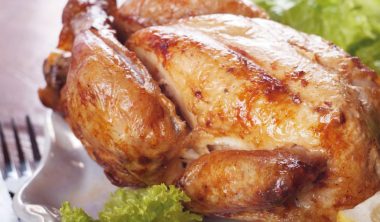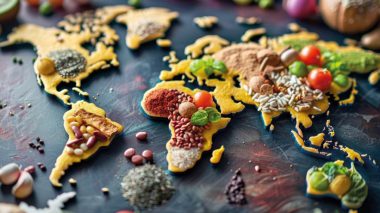
Food is perhaps the most essential of our primary needs, and something we are all deeply connected to. Food is a theme woven throughout our history. Scarcity has sparked wars, hunger has driven migration, customs define our communities.
- Over the years, we have learned and cultivated various tools and systems as a means of meeting our needs, but as the global population (and therefore demand) has increased, these systems have had to adapt to continue meeting those needs.
- That necessity has led to the development of international trade – a vast, complex system that supports nations in balancing their resources, allowing for the movement of food to places where local production alone may not suffice.
The evolution of the food system has brought with it critical challenges and responsibilities
- Issues like food safety, food security, animal health and welfare and sustainability have rightly emerged as focal points, considered equal in importance to production itself.
- They are a given for those producing our food, but they are not always well understood by those consuming it.
- As a result, food production faces a serious discrepancy: the gap between its internal efforts to stay on top of discussion and public perception, often shaped by incomplete or misleading information.
Over time, this has led to something of a paradox, one that is incredibly difficult to escape. Food production, key to providing our essential needs, has become a frequent target of criticism in the public area – and the poultry sector is no exception.
- It is a complex paradox, one that our sector exemplifies particularly well, whereby there is conflict between the perception we have of ourselves, versus how we are perceived externally.
Certainly, the rise of vegetarianism and veganism have added a layer of complexity to the debate, presenting alternative viewpoints that challenge the role of meat in a thriving, resilient and sustainable food system.

We want to make it clear that we are not telling people what they should or should not eat. We respect everybody’s choice. However, what we do not want to see are those who do not recognise the values that define the poultry sector telling our story for us.
- Despite playing a crucial role in our global food security, providing nutritious, affordable and widely accessible food, the image of poultry production not kept pace with its contributions.
- We must acknowledge that, as a sector, we bear some responsibility in this space. We have taken a backseat when it comes to communicating what we stand for.
- But we cannot let our sector, and by extension our role in the food system, be defined by external narratives and misconceptions.
- Unlike some of our biggest critics, we will not take the approach of talking about (and finding flaw in) what others do.
- Our communications must be about what we do, and what we do really well.
- Therefore, we must leverage our accomplishments, progress, and successes to shape our position in the broader conversation, ensuring that poultry’s contributions are recognised and valued.
On the one hand, we have made remarkable strides in ensuring global food security through:
- Resource optimisation.
- Innovation.
- Investment in research and development.
On the other, we have failed to actively involve the public in evolution of our processes.
As a result, many consumers are unaware how much modern-day poultry production systems have changed and grown.
- For instance, Food and Agriculture Organization (FAO) data shows that greenhouse gas emissions per unit of poultry meat production have fallen by over 60% since the 1960s.
- This is a remarkable accomplishment, achieved via concerted efforts across the entire production chain, from genetic improvements to optimised resource use to increased knowledge-sharing.
- Yet, despite all this wonderful progress, a significant gap remains between public perception and reality.
This disconnect was most evident at the recent Food System Summit, organized by the United Nations. A phrase cropping up in numerous discussions was that the food system was, quite simply, “broken.” Net of narratives adverse to the rearing of animals for food, this raises an important question:
- How can we address perception to both prevent long-term harm to our industry and the broader food system?
- How can we reshape understanding of what we do, why we do it, and how we are crucial players in our global food system?
MY ANSWER IS “TO BE BOLD”
The poultry sector has long since embarked on a path of continuous improvement and greater transparency.
- Companies and national associations are increasingly committed to effective, open and proactive communication, understanding that this is as critical to the industry’s resilience as our technical and economic investments.
- While reactive responses are necessary at times, they cannot create lasting impressions.
With the public hungry for information and for answers, we have an opportunity to position poultry as the forward-thinking, credible, and innovative industry we know it to truly be. We simply need to be braver in putting ourselves out there.
The strength of our sector lies in its ability to gather data, prioritise collaboration and, more often than not, provide a concrete answer – often before it enters the court of public opinion and ahead of regulatory mandate.
- Our efforts in tackling antimicrobial use (AMU) and resistance (AMR) provides a great example, and also offers a practical model for proactive engagement.
- The voluntary adoption of antimicrobial stewardship principles across our International Poultry Council (IPC) community has positioned the sector as leaders in animal health and welfare.
- Early adoption combined with clear and data-driven messaging has garnered positive recognition worldwide.

This commitment to stewardship was highlighted in 2024: the USAID-led TRANSFORM project, in which the International Poultry Council (IPC) plays a key role, was included in Fortune’s ‘Change The World’ list.
- This is a huge accomplishment, and one we should not shy away from talking about. It proves that co-ordinated and proactive communication holds the power and potential to shape opinion and perception.
- Now, IPC’s efforts are concentrated on building on this success, ensuring continuity and coherence of intent across our membership to set more ambitious goals.
- Just as we’ve led on AMU and AMR, the poultry industry is approaching challenges surrounding Avian Influenza with the same transparent and proactive nature.
- It seems to us that the world forgets that the sector itself suffers the consequences of these outbreaks.
- Producing safe, high quality and affordable animal protein requires a commitment to animal health and welfare, and this includes the rigorous implementation of the international standards to minimise the impact of Avian Influenza.
- National guidelines and best practice then provide a clear framework within which all participants operate, ensuring each actor operates and contributes effectively to disease prevention and management.
- IPC role is to advocate for a holistic approach to AI, not focusing on a single intervention, but rather taking into account all intervention tools available, and national or regional peculiarities.

Poultry has a good story to tell. But, in an information-driven world, if something is not publicly known it may as well not have happened.
- Establishing trust is critical to our social license to operate in a thriving and resilient food system, and that requires us to communicate openly our values and contributions. We cannot take trust for granted.
- We must continually work at it to enhance external understanding, including that of our critics. Because, whether we like it or not, building this trust is what is going to allow us to progress as an industry.
Our openness and transparency are grounded in the expertise of those working within our industry. Their knowledge, experience, and commitment to high performance are the vehicle driving poultry production forward, step by step.
We want to be able to create ways to showcase these accomplishments. As part of this process, the IPC aims to take the contributions that define our sector and share in them in global forums, advocating for poultry’s role in our wider food system.
We have an opportunity and, more importantly, a responsibility, in international settings to communicate the social, economic, and cultural value of the poultry sector. Because, if we cannot speak for ourselves, who will speak for us?
- Poultry is in a unique position to demonstrate leadership within our global food system.
- In our ability to produce safe, affordable, and nutritious food at scale, we offer real solutions to pressing challenges.
- I believe that is our ticket to bridging the gap between perceptions of our value chain and the reality of our contributions.
I may be biased, but I believe that we are an exciting sector, filled with great people doing incredible things all around the world. By showcasing what we do, how we do it and why we do it, we not only can address concerns and misconceptions, but we can position poultry production as a dynamic driving force for positive change.
- Committed to responsible practices and food security, we understand poultry to be key component of a resilient, global food system.
- Standing firm in these commitments, I know that we can build a future where our contributions are clearly understood and valued, both within our industry and beyond.
Source: Avinews.com







